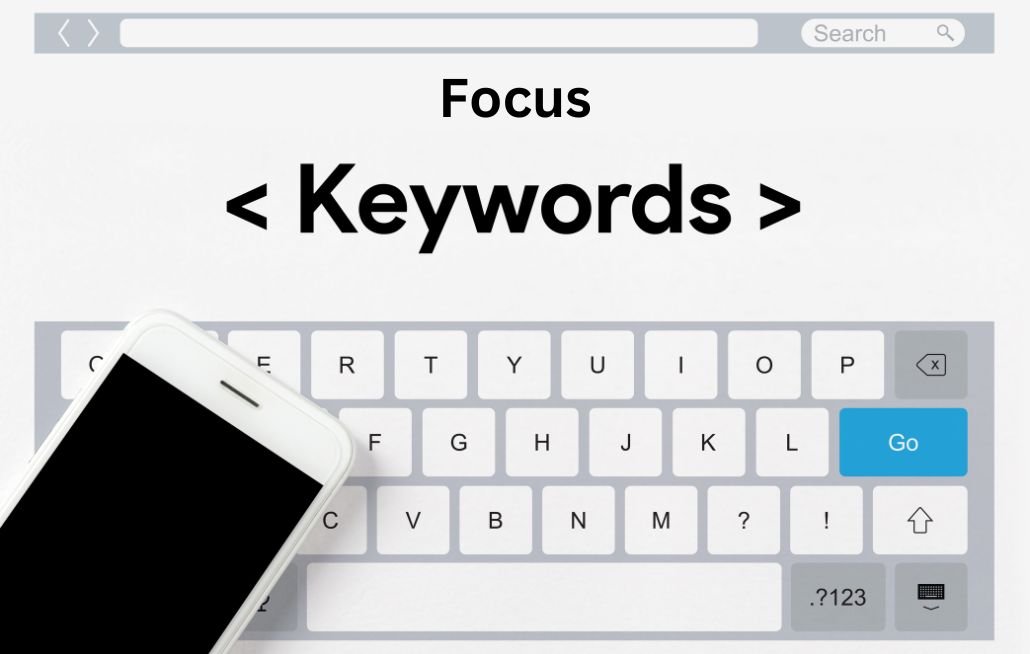Table of Contents
Seeking the best and easiest way to choose the right focus keywords for your blogs?
You need a strategic approach that considers the intent, location, difficulty, volume, and length of the keyword. That’s what this article is all about. We will discuss only those parameters that will help you select the best focus keywords and rank higher on various search engines.
Let us get started!
What Are Focus Keywords?
Focus keywords are single word or group of words that we aim to rank our blogs on. Essentially, they represent the searchers’ intent, and by selecting the right focus keywords, we can improve our position in search results.
Therefore, it becomes crucial to craft content that aligns with the chosen focus keyword.
Why should you use the focus keywords?
Focus keywords are essential for optimizing your content and attracting organic traffic to your blog. By understanding what users are searching for and strategically using relevant focus keywords, you can boost your website’s visibility and reach your target audience more effectively.
Also read: Use SEMrush for Keyword Research
How to Choose Focus Keywords for Blogs to Rank Higher
It’s necessary to select a keyword research tool for searching for the correct keyword or keywords for your blog. Almost all the tools are similar in use. Let’s consider SEMrush as an example to understand the best way to get the focus keywords using an SEO tool.
Here is a series of factors that matters while choosing focus keywords for your blogs or articles:
1. Understand the Intent of the Searcher
Before choosing the focus keyword for your writing, you should understand the searcher’s intent as well as your target audience. This will help you with a concept of selecting the keyword or keyphrase.
For example
You want to sell ‘Shoes‘ online. You can’t use “Shoes” for your product blog as it is a broad keyword to write and rank on. However, you can see other information about your product, such as:
- It is for male or female
- Size of the shoes
- Colors of the shoes
- Material of the shoes
Hence, you can target these features for choosing the focus keyword for your product page.
2. Location for the Keyword Details
Once you enter your keyword idea, you need to select the country you want to check the volume, keyword difficulty, and other details for.
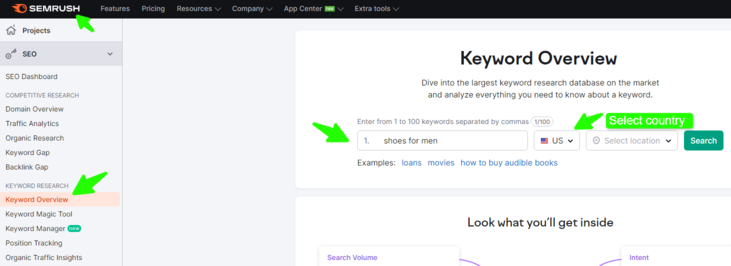
3. Keyword Intent of Focus Keywords
You should search the focus keywords according to its intent. Otherwise, Google or other search engines may ignore your content.
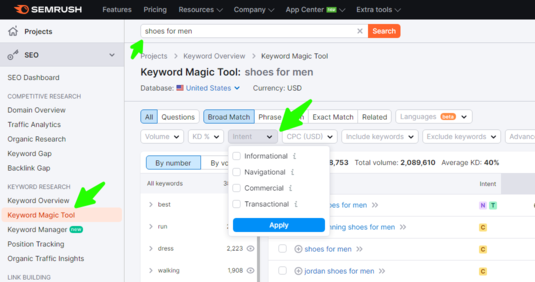
Basically, there are 4 keyword intents:
A. Informational Intent (I): When users are looking for information on a particular topic. They want to learn something, get answers to questions, or understand a concept.
Example keyword: “how to tie a shoe.”
B. Navigational Intent (N): Users use navigational intent when they are trying to find a specific website or web page. They already know the site they want to visit and use search engines for quicker access.
Example keyword: “where to buy shoes.”
C. Transactional Intent (T): When users are ready to make a purchase or perform a specific action. They are looking for a product, service, or tool to fulfill their needs.
Example keyword: “buy shoes online.”
D. Commercial Intent (C): Users with commercial intent are interested in gathering more information before making a purchase decision. They are comparing products, reading reviews, or looking for the best deals.
Example keyword: “best shoes for men.”
Make sure you are selecting the correct keyword intent.
4. Keyword Difficulty
Keyword Difficulty is a metric used in SEO (Search Engine Optimization) to measure how hard it is to rank a specific keyword on search engines like Google. It indicates the level of competition and effort required to achieve a higher ranking for that keyword. The higher the difficulty score, the more challenging it is to rank well for that keyword.
Additionally, it is important to select the keyword difficulty level according to your domain authority.
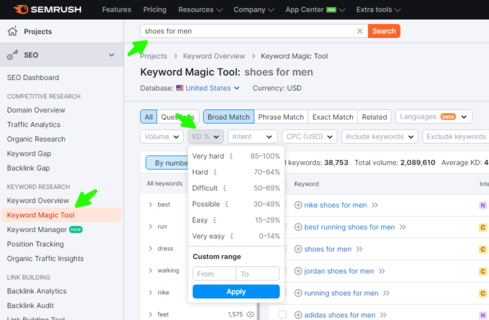
Let’s take a look at how to select a keyword difficulty level based on domain authority.
| Keyword Difficulty level | KD (%) | Domain AUthority (DA) |
| Very easy | 0-14 | Below 5 |
| Easy | 15-29 | 5 to 10 |
| Possible | 30-49 | 10 to 20 |
| Difficult | 50-69 | 20 to 40 |
| Hard | 70-84 | Above 40 |
| Very hard | 85-100 | Above 50 |
Targeting “Possible” or above that would be good focus keywords for your blog. However, it depends on the DA of your website.
If you don’t have good Domain Authority and you want to select tough keywords, you simply can add and increase the backlinks for the particular blog. It will increase the chances of ranking on search engines.
5. Keyword Length
Keyword length refers to the number of words in a search query or keyword phrase used by users when looking for information or products on search engines like Google. The length can vary, and keywords can be categorized into two main types:
A. Short tail keywords
Short tail keywords are brief and usually consist of one or two words. They are broad and general in nature, attracting a larger search volume.
However, due to their broadness, short tail keywords tend to have higher competition, making it challenging to rank well for them.
Examples of short tail keywords include “shoes,” “digital marketing,” or “travel destinations.”
It’s recommended to target short tail keywords if your domain authority is above 20 at least.
B. Long tail keywords.
Long tail keywords are more specific and typically consist of three or more words. They are more detailed and closely match what users are searching for, resulting in lower search volumes.
However, the advantage lies in their lower competition, making it easier to rank higher for these keywords.
Examples of long tail keywords include “comfortable running shoes for women,” “best digital marketing strategies for startups,” or “affordable family-friendly travel destinations in Europe.”
It’s better to choose long tail keywords for your blogs until or unless your website has 20+ domain authority.
6. Keyword Match Types
There are three different keyword match types
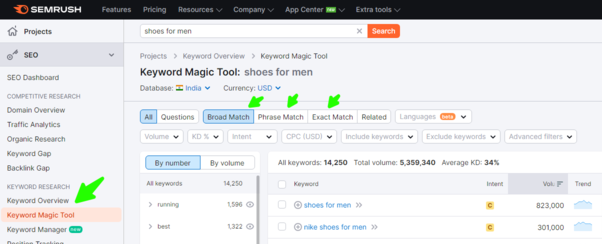
A. Broad Match
Broad match allows your ads to appear for a wide range of related search queries, including synonyms, misspellings, and variations. It casts a broad net, making it ideal for advertisers seeking maximum exposure. However, be cautious, as broad match may lead to less relevant clicks.
Example: men’s shoes, footwear for men, or shoes for guys.
B. Phrase Match
Phrase match narrows the scope compared to broad match but still offers a good reach. Your ad will display when a user’s search query includes the exact keyword or close variations with additional words before or after it. This match type strikes a balance between reach and specificity.
Example: best shoes for men, black shoes for men, or running shoes for men.
C. Exact Match
Exact match provides the highest level of precision targeting. Your ad appears only when a user’s search query precisely matches the keyword or its close variants. This match type delivers highly relevant clicks but restricts your ad’s reach.
Example: shoes for men or men’s shoes.
7. Keyword Volume
Keyword Volume refers to the average number of searches a specific keyword receives per month. Keyword research tools provide this estimate once you select other parameters, such as search intent, location, keyword difficulty, and more.
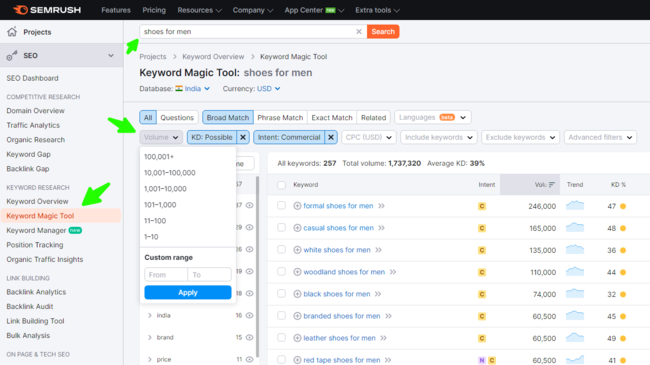
The standard of the range of the keyword volume on keyword research tool
A. 100,001+
B. 10,001-100,000
C. 1,001-10,000
D. 101-1,000
E. 11-100
F. 1-10
G. Custom Range
Strategic Placement of Focus Keywords in Blogs for Improved SEO
Some of the common places where you should implement the focus keywords in blogs:
- Place the focus keyword in the blog’s title or headline.
- Include the focus keyword in the meta description.
- Integrate the focus keyword naturally within the first paragraph of the blog.
- Sprinkle the focus keyword throughout the blog’s content, but avoid overstuffing.
- Use the focus keyword in subheadings or section titles.
- Include the focus keyword in the alt text of relevant images.
- Consider using the focus keyword in the blog’s URL.
- Use the focus keyword in the conclusion or call-to-action (CTA) section of the blog.
Final Thought
Selecting the right focus keywords for your blog is undeniably crucial in your journey to rank higher on search engines. By understanding your target audience, conducting thorough keyword research, and leveraging various keyword match types, you can strike a balance between broad visibility and precise relevance.
Remember to prioritize high search volume with moderate competition and explore long-tail keywords for specific intent. A well-crafted content strategy, enriched with your chosen focus keywords, will undoubtedly boost your blog’s visibility and attract organic traffic.
So, let “Focus Keyword” be your compass in the realm of SEO, leading you towards higher rankings and a more engaged readership.
[article_faq]

